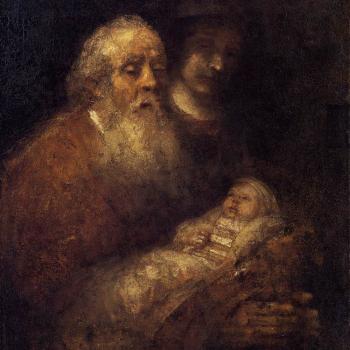I began this series with a comment about the ways I have often imagined the Spirit as an ayah—a constant companion, teacher, friend, and surrogate mother. While I’ve come to understand and experience the Spirit as much more than that, the ayah image has not faded, but rather intensified. Sometimes when I find the whole Christian story just too much to believe, and the idea of a Father God seems completely mythical and the Jesus-story an impossible fantasy, I still cling to the Spirit. That there is a Spirit of God in the world always seems to me so patently obvious, so present, so intrinsically essential to all beauty and love that in my atheist moments, I take refuge in faith in the Spirit. I turn the face of my soul to that surrogate mother and rest there and the Spirit gives me eyes to see and ears to hear and a heart to understand.
Jesus’ words often come to my mind: “How much more will the Father give the Holy Spirit to those who ask!” I think about being filled with the Spirit, and I know that I want the Spirit to flood the dark and dank corners of my life—the ones where I sit and grieve over senseless evil and random suffering; the ones where I fumble through all the “answers” I’ve learned and try to plug them into the questions that gnaw at my soul; the ones where I see nothing but the mundane; the ones where I cannot be what I imagine I should be. Keep asking, keep asking. And who is reminding me of Jesus’ words? Who is encouraging me to keep asking?
This is the sixth in this series on life in the Spirit. I began by examining three core postures that are elementary to asking the Father for the Spirit: consent, repentance, and belief. Mary showed us the first posture: consent. Peter showed us the second: repentance. Nicodemus (and Ezekiel) showed us the third: belief.
Really, without these three fundamental postures, we cannot hope for the Father to give us his Spirit. I must say yes; I must turn to God fully and constantly; I must believe.
Then I began to look at some of the ways we experience the Holy Spirit in our lives. In my last post, I focused on Paul, who tells us that part of that experience is God’s tending to our souls, like a Gardener, encouraging us to uproot the noxious, strangling weeds in our souls and to bear the fruit of freedom.
See also: Life in the Spirit Series
But God isn’t waiting for us to create a new Eden in our souls, and we are not alone in this battle of the weeds. In fact, we are not alone at all. When we receive the Holy Spirit, we experience the Spirit as guide, ever-present companion. The Te Deum, a 4th-century creedal prayer long used in the Church, celebrates the Trinitarian love. Notice the description of the Spirit right in the middle.
Te Deum
You are God: we praise you;
You are the Lord; we acclaim you;
You are the eternal Father:
All creation worships you.
To you all angels, all the powers of heaven,
Cherubim and Seraphim, sing in endless praise:
Holy, holy, holy Lord, God of power and might,
Heaven and earth are full of your glory.
The glorious company of apostles praise you.
The noble fellowship of prophets praise you.
The white-robed army of martyrs praise you.
Throughout the world the holy Church acclaims you;
Father of majesty unbounded,
Your true and only Son, worthy of all worship,
And the Holy Spirit, advocate and guide.
You, Christ, are the king of glory,
The eternal Son of the Father,
When you became man to set us free
You did not shun the Virgin’s womb.
You overcame the sting of death
And opened the kingdom of heaven to all believers.
You are seated at God’s right hand in glory.
We believe that you will come and be our judge.
Come then, Lord, and help your people,
Bought with the price of your own blood,
And bring us with your saints
To glory everlasting. Amen.
Advocate and guide. The Church gets these titles from John 14-16, the chapters with the most highly developed thought in the New Testament around the personality of the Spirit. Here Jesus’ teaching is completely private, for his disciples only.
Jesus is completely realistic about these last words of encouragement and warning to his friends. The three chapters are preceded by warnings of Peter’s imminent failure, and conclude with warnings of troubles ahead. The message throughout? Trust anyway. On what basis? The companionship of the Holy Spirit.
Here the Spirit is called the Paraclete, or the Come-Alongsider. The Spirit is Companion, Comforter, Advocate, Guide, Supporter, Strengthener. Ayah?
Jesus seems to understand that the work of figuring out the way ahead, the way to live and love and work and believe, is not easy for anyone (Philippians 1.9-10). We all need to discern, and we fumble our way forward, yet Our Lord isn’t dismayed or deterred by our failures, even our failures of love (Luke 22.31-34). He welcomes “trying to obey”; he doesn’t demand perfection, he wants holiness. The former is about flawlessness; the latter is about unquenched love.
Julian of Norwich encourages us in the same way: “Our courteous Lord does not will that his servants despair, either for frequent or for serious failures, for our failures do not prevent him from loving us.”
Now it seems to me that when we’re talking about a Companion whose goal is to help us reach the heights of holiness—described in John with the language of trust, obedience, love, and abiding—we’re talking about a spiritual Sherpa. Sherpas are natives to Nepal and Tibet, Himalayan heroes; they are the elite mountaineering guides who help climbers on the riskiest ascents. They create the way, set the ropes, read the weather, point out the crevasses, encourage, warn, rescue. “Paraclete” sounds very theological; “Sherpa” less so. But in the Upper Room teaching, Jesus brings the disciples along in an understanding of the ways they will experience the Spirit as divine Sherpa.
- With that kind of intimacy undergirding their lives, the disciples can move in sync with what the Spirit is doing in and for the world (John 15.18-16.1). It won’t be easy, for the world always resists the Spirit. The world doesn’t understand the Spirit, and it hates the way the Spirit works. But together, with the Spirit, we witness to the presence of God, and the Spirit will help us discern how and when.
- He begins by binding their hearts to God through the Spirit (John 14.15-27). God’s plan is intimacy, affection, and the Spirit is the channel of that companionship with God. This intimacy is revealed in obedience, which is not a condition of that intimacy but the consequence of it. The Spirit isn’t our Guide in the way that a user manual is a guide. It’s not all about instructions and troubleshooting. If it isn’t companionship, it isn’t the Spirit.
- In that discernment, we must remember that it is the Spirit alone who will bring about the Kingdom (John 16.5-15). Our witness is never coercion and it never achieves the final results. The Spirit alone convicts the world of sin, shows the way to right relationship with God, and brings about the defeat of evil. As our Advocate and Guide, the Spirit works through us to accomplish God’s plans, but we are the junior partners in a major work.
All this is what the Church has called mystagogy—inner teachings of life with God. Judas—who had traveled with Jesus, listened to all his teachings, watched the miracles up close and personal, participated in the Last Supper, had his feet washed—couldn’t have digested these words of Christ.
The Gospels give us a perfect picture of how this theology plays out in a life. There’s a man who shows up for only ten verses in all the Bible, yet he displays for us the very meaning of the Spirit as Guide. More and more, I want to live like this man. He’s up next.
Until then, a suggestion for practice: EVERY time you turn to Christ—with a simple thought, a hope or prayer, a yearning for God—that is the movement of the Spirit. The Spirit is your Advocate and Guide, a companion who never leaves you or forsakes you. Jot down the things you face in the week to come that gives you some measure of concern. Pray for the Spirit’s presence and guidance as you fumble your way through them. The Spirit delights in your desire.
Image via Pixabay.













